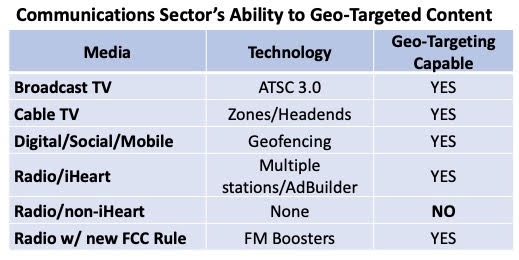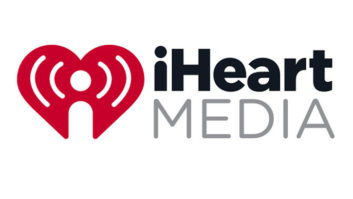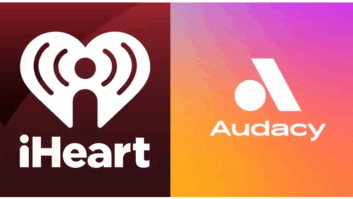GeoBroadcast Solutions is again firing back at iHeartMedia for opposing its request that FM broadcasters be allowed to geo-target content.
The FCC has a rulemaking proceeding on the idea, as we’ve reported; iHeartMedia in a series of filings has voiced concern based on what it calls unresolved technical questions and the risk of splintering the local advertising market.
GBS says its technology, which it brands as ZoneCasting, gives FM broadcasters an advantage by allowing them to air content intended for specific coverage areas for limited periods of time. It uses FM boosters to allow for hyperlocal advertising and content independent of the signals of its primary station within different portions of the primary’s protected service contour.
GBS has compared its technology to iHeartMedia’s AdBuilder website feature, saying that the latter essentially mirrors ZoneCasting in that it allows advertisers to select communities on a map to target their ads.
iHeartMedia argued back that the comparison is inapt.
“In fact, the AdBuilder interface simply allows potential advertisers, including small and medium businesses, to produce and purchase spots to air strategically over iHeartMedia radio stations’ full broadcast service areas and is nothing like FM booster ZoneCasting,” iHeart said in its February 2022 filing.
iHeart continued: “Nevertheless, to support its strawman contention that iHeartMedia is seeking to reinforce and protect its AdBuilder offering, GBS fundamentally mischaracterizes AdBuilder as being essentially equivalent to ZoneCasting.”
The company noted that the NAB has expressed concern about possible undermining of the broadcast industry’s business model if advertisers could select desired target areas of a station’s broadcast signal, thus creating the ability to geo-target affluent “Gold Coast” areas of a station’s service area.
“The lack of comprehensive testing by GBS in a multitude of settings, endorsement by a government agency of a single vendor’s exclusive and proprietary technology, potential for redlining by advertisers, costs to implement and the disruption to net advertising revenues necessary for broadcasters to serve the listening public,” the media company argues.
[Related: “Large Groups Raise a Caution Flag on Geo-Targeting”]
GBS, in a letter last week to the FCC, replies that its fundamental point when comparing ZoneCasting to AdBuilder is that a prominent feature of the technologies is the same: “to enable advertisers to reach intended audience both contextually and geographically.”
The technology company disputes iHeart’s claim that ZoneCasting could burden broadcasters economically.
“That is baseless. The proposed rule would permit the use of geo-targeting technology on a voluntary basis, so it imposes costs on no one,” GBS told the FCC. “If iHeart or any other broadcaster does not want to invest in the future, then they need not. For those broadcasters who choose to adopt this technology, there are options to finance any costs.”
[GBS commentary: “ZoneCasting Will Level the Playing Field for Radio”]
GBS says iHeart’s argument that ZoneCasting could cause harmful interference is based on year-old NAB comments that did not include a technical investigation. “More problematically, iHeart’s Feb. 8, 2022, filing ignores technical demonstrations and analysis of geo-targeting submitted to the commission five months ago that provided robust evidence that geo-targeting using boosters enhances the listener experience, works well with the existing emergency alert system, and causes no interference to any other broadcaster,” GBS wrote.
GBS has said that any resulting co-channel interference or self-interference would be manageable and not detrimental to listeners.
The company goes on to say numerous supporters including stakeholders representing minority-owned broadcasters and civil rights advocates have praised the opportunity to lower the barrier to entry for small businesses seeking to advertise on radio and promote the growth of stations that benefit.
“The proposed rule change advances the public interest by also enabling broadcasters to deliver geo-targeted news, traffic, weather and other vital content to their community. That is the epitome of localism, and the commission should embrace that goal to put radio on par with all other media,” GBS concludes.
The GBS letter, prepared by Covington & Burling LLP, included the graphic below indicating terrestrial radio is the only major broadcast platform lacking the ability to geo-target content.







